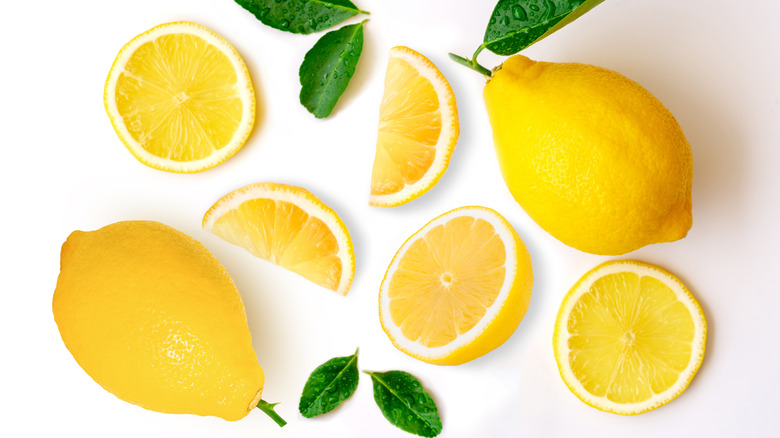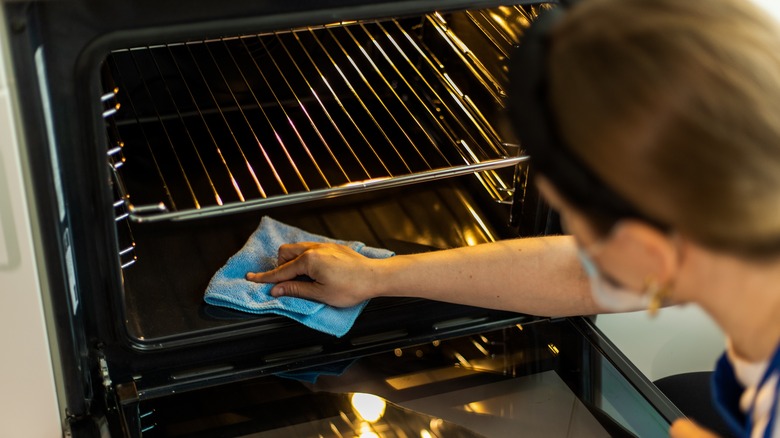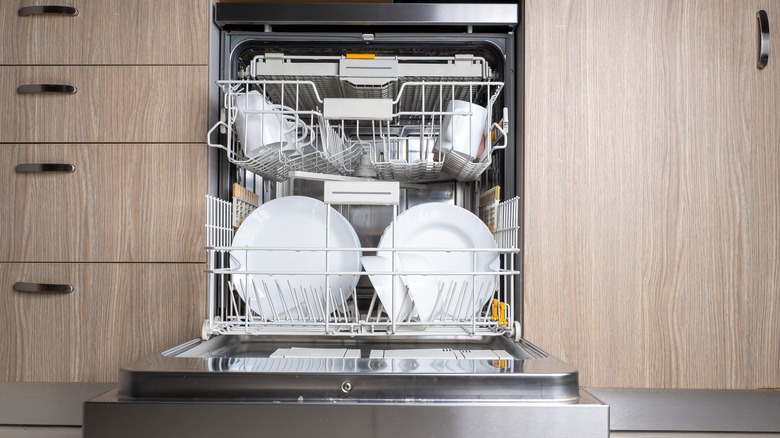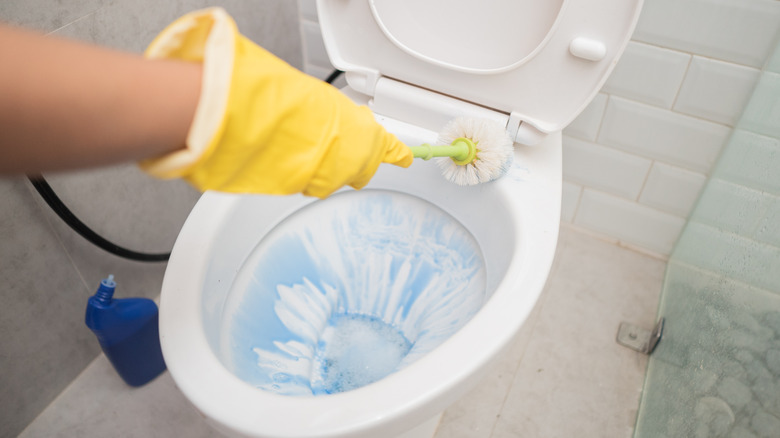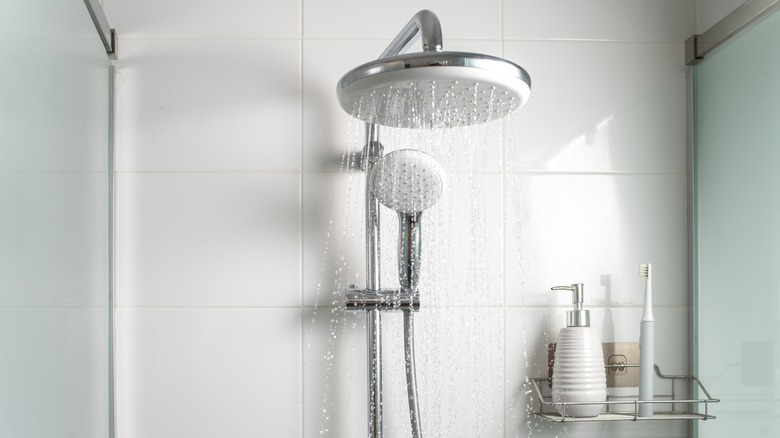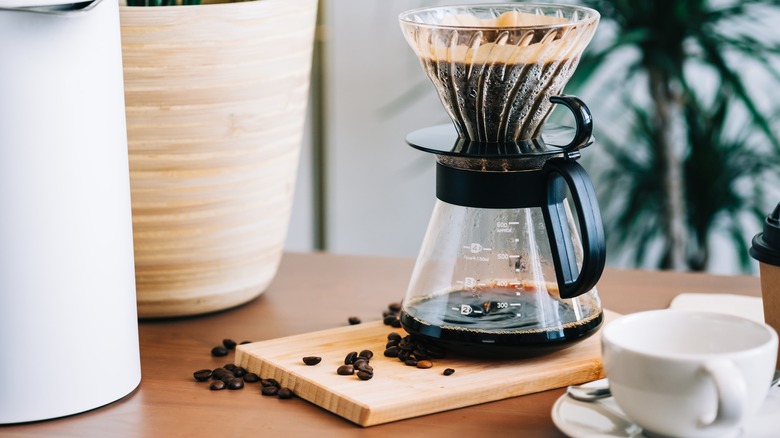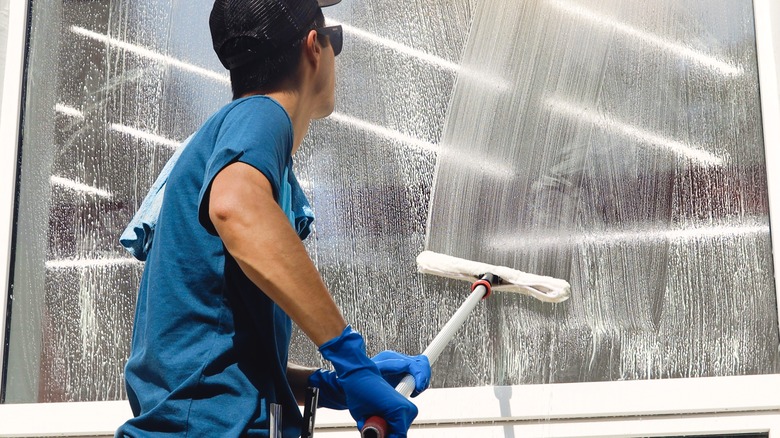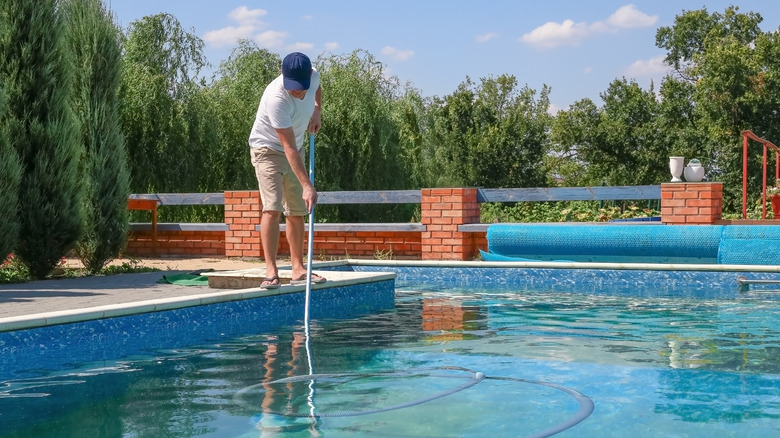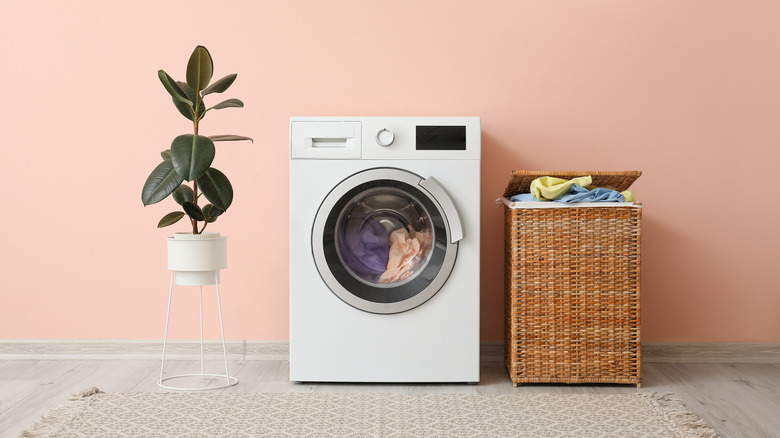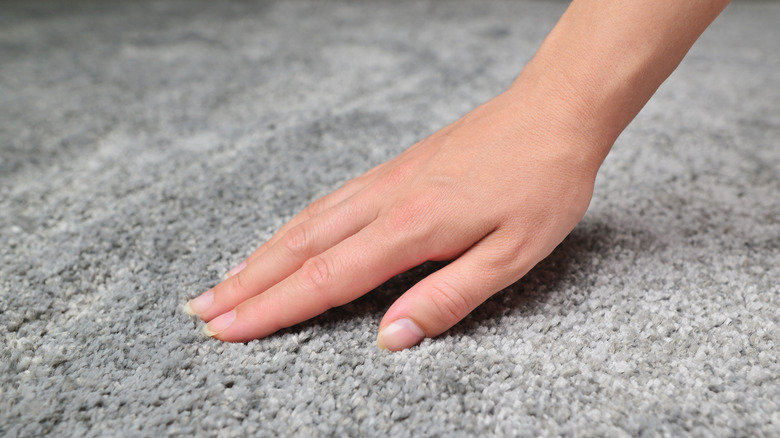How To Clean With Citric Acid
Cleaning the home could be a time-consuming and daunting task, but it doesn't have to be hard. Citric acid is composed of the juice from citrus fruits and berries that could also be used for basic cleaning habits. According to Purdy & Figg, when it comes to modern day cleaning, citric acid is used as an alternative to bleach to whiten and disinfect spaces in the home. Due to its corrosive properties, it shouldn't be used to clean marble or stone countertops because the solution may erode the material. Wooden floors also shouldn't be cleaned with citric acid because most are covered with a wax coating that could wear away.
Though citric acid can be harsh when it comes to cleaning certain surfaces, it is primarily used as a descaler. It can remove rust, soap scum, and water stains from faucets, toilets, and shower heads. It's also used to fight against harmful bacteria and mold from causing serious illnesses and diseases within the home. Using citric acid to clean is uncomplicated. To keep a clean and healthy home, incorporate these steps into your cleaning routine.
Use it to clean your oven to improve the taste of food
Cleaning the oven regularly has its benefits. According to Ovenclean, it enables food to taste better, and accidental spills from food debris could cause fire hazards and burning. A clean oven also allows for even baking because the heat is distributed evenly throughout the oven. If cleaning the range seems to be a daunting task, you can compare rates online and call a professional to clean it.
However, if you don't mind a little scrubbing, you can make your own oven-cleaning concoction with citric acid. Squeeze lemon juice out of two lemons to place inside of a baking dish filled with 1/3 cup of water (via Electrodry). Put the baking dish with the lemons inside the oven at 250 degrees for 45 minutes. After cooking, take the dish out and let it cool. Once the baking dish is cool, use a scouring pad to dip into the solution to clean the inside of the oven. It's best to take out racks to wash and dry separately before placing them back. As always, make sure the oven isn't turned on while cleaning.
Use citric acid to remove dishwasher clogs
To have a dishwasher that works efficiently, there shouldn't be any food particles clogging up the drain and spray arms, as stated by Greatist. Clogs reduce water circulation during the wash and rinse cycles. When this happens, glasses and dishes have a film of soap and food residue. You need to clean the dishwasher's filter and drain at least once a month for cleaning to be effective, and you can do that with citric acid.
Check out local drugstores or grocery stores for citric acid crystals. While some stores may have both crystal and liquid formats, experts recommend the crystal option. The liquid citric acid usually dispenses before the washing cycle kicks into high gear, making it less effective (via GE Appliances). Put 3 to 4 ounces of citric acid crystals inside the machine's detergent cup and run the dishwasher on a normal cycle. Follow up with a regular dish detergent wash. Dishwasher-safe dishes without embellishments could stay inside during the citric acid cleaning, but take out dishes and plates with silver and gold trimming to prevent them from getting tarnished. Washing with citric acid crystals is a sure way to have a clean dishwasher and dishware.
Get rid of dirty toilet rings
Everyone knows how frustrating it is to get rid of ringed stains around toilets. These stains come from limescale. According to Moral Fibres, discolored limescale stains are a buildup of different minerals such as lime, calcium, and magnesium, and powdered citric acid is a suitable way to clean them. People prefer using powdered citric acid because it's biodegradable and flows easily down water pipes when flushed.
Clean the toilet with powdered citric acid by pouring hot (but not boiling) water into the toilet bowl. The hot water should react quickly with the powdered citric acid to work effectively as a cleaning solution. Add 125 grams of powdered citric acid into the toilet bowl for at least an hour or overnight. Flush the toilet, and then use regular toilet cleaner and a brush to clean any remaining stains. Don't mix bleach with powdered citric acid because the concoction could pose harm and cause irritation to the lungs, eyes, and skin. Handle powdered citric powder while wearing gloves, and don't rub your eyes.
Decalcify shower heads
Ever wonder why water doesn't come out of shower heads properly? This is due to mineral deposits and grime that clog shower head holes, as The Shower Head Store noted. When this happens, water doesn't flow evenly. Don't use bleach when cleaning shower heads because it could increase the spread of certain bacteria commonly found on shower heads. Commercial cleaning products aren't the best to use either because they contain harsh chemicals that could strip the material.
Instead, powdered citric acid would be a quick and safe way to clean a shower head (via Villeroy & Boch). Unscrew the shower head from the shower pipe and put it into a bowl of cold water mixed with 1 teaspoon of powdered citric acid. Keep the shower head soaked for 15 to 45 minutes to decalcify completely, and rinse it under water to eliminate traces of citric acid. Screw the shower head back onto the shower pipe to use for showering in the future.
Deodorize a dirty fridge
While most people don't love cleaning their refrigerators, it's important to do so regularly to keep everything clean and smelling fresh. When refrigerators aren't cleaned regularly, food becomes spoiled, and cross-contamination could occur, as per Wilshire Refrigeration & Appliance. While a vinegar spray could be used to clean up spills or dirt, lemons could be used to deodorize the inside of the refrigerator (via Anita's Housekeeping Referral Agency).
Clean with citric acid by grabbing a handful of lemons to squeeze onto a cleaning cloth. Simply rub down the inside and outer surfaces of the refrigerator to break down bacteria and clean dirty spots. Freshen the interior by placing a plate of cut lemons towards the back. The lemon scent is natural and pungent without overwhelming the kitchen with strong perfume-like smells. It'd be a smart idea to change out the dish of lemons every week or so to keep everything smelling fresh.
Clean grubby tiles
Bathroom floor tiles tend to get dirty due to people coming in and out of the bathtub after showering. According to Get Set Clean, bathrooms are susceptible to mold and fungus due to dampness coming from scattered water. Children and older adults with compromised immune systems could experience illnesses and catch diseases due to the bathroom's lack of hygienic cleaning and sanitation.
According to Home Carpet One, one easy way to sanitize your tiles is to mix 1 cup of citric acid with 1.5 gallons of water to sweep over the surface with a mop. However, not all tiled floors are made equally. Some may be made with material that could erode if citric acid is applied. Check with the manufacturer of the tiled floor to be sure it's okay to use citric acid to clean. If not, you could call a professional floor steaming company to do the job.
Keep coffee tasting fresh
When coffee makers aren't cleaned or descaled, the coffee loses its taste. Minerals like calcium and magnesium build up in hard water, as noted by Urnex. When this happens, the full flavor from the beans won't be as obvious. If there's too much mineral scale buildup, the coffee won't be hot enough, and the brew will become tepid, weak, and possibly bitter. Too many blockages and clogs in the coffeemaker could cause it to break and be unusable.
Use citric acid to clean coffee makers by putting 2 tablespoons of citric acid in the coffeemaker's water reservoir (via De'Longhi Coffee Lounge). Repeat the "flushing" process two times with water. While some people may prefer to use white vinegar to clean coffee makers, sources say it's not a good idea to do it. Vinegar is too corrosive and has a strong odor. Many coffee companies have their own descaling solutions for their coffee machines. Make sure to use the coffeemaker descaling solutions that go with the specific brand. Not all coffeemakers are created equal, and they all use different descaling solutions.
Make glass surfaces look shiny and new
Since many homes have several windows, it's pertinent to ensure they're clean and shiny for aesthetic purposes and regular upkeep. Karcher said windows might need to be cleaned more often if the pollen count is high outside, there have been continuous thunderstorms, or the weather turned arid and there's an uptick in dust. Pick a "gray" day to clean windows because overly sunny days dry glass too quickly, and streaks could form soon after cleaning. Use 2 to 3 tablespoons of citric acid with 2 pints of water to clean windows with a microfiber cloth.
Make your own citric acid and water solution by mixing it in a spray bottle (via Life Should Cost Less). By using a spray bottle, windows are cleaned more precisely and accurately than by just using rags. Another way to make a window cleaning solution with citric acid is to combine extra ingredients into the spray (via Simple Solutions). Mix 2 cups of water, 2 tablespoons of citric acid, ¼ cup vinegar, 1 tablespoon of cornstarch, and ¼ cup of isopropyl alcohol in a spray bottle. Vinegar dissolves mineral deposits and has antibacterial properties. Isopropyl alcohol breaks down grease and oil, which could be helpful for parents who have kids or pets who love to put their faces and hands on windows, causing smudges. Corn starch is abrasive and gets rid of hard stains. These products are inexpensive and can be purchased at any grocery or drugstore.
Clean stains in family pools
Families who own outdoor swimming pools understand how hard it is to keep them clean. Pools get stained due to environmental causes over time, as per eHow. Citric acid can be used to clean pools made from fiberglass, concrete, acrylic, and plastic. Unlike muriatic acid, citric acid isn't as harsh and won't eat away at the pool's surface.
Before using citric acid to clean a pool, remove debris and drain the water. Grab a garden watering can, and fill the can with 1 gallon of water followed by 1 gallon of citric acid powder. Pour it on the walls, and give the area about 30 seconds to dry before using a brush to scrub and the hose to rinse. Repeat this same process around to other areas of the pool. If there's any remaining citric acid at the bottom of the pool, use baking soda to neutralize and dissolve it. People should wear gloves and other protective gear when using citric acid to clean the pool. Any citric acid that's not neutralized could harm pets and young children if they ingest the chemical solution. While pool owners could do their own cleaning with the solution, it may be best to call a professional pool cleaner for efficiency.
Get clothes looking whiter and cleaner
Having a clean washing machine not only allows the appliance to clean clothes effectively, but also enables people's clothes to look whiter. Fabalabse notes that tap water contains rust and chemical elements, which could cause washing machines not to wash clothing well and cause unpleasant odors to come from the device. One way to clean the appliance is with citric acid, which won't damage the washing machine when used in lesser amounts. Be sure to take out any loose change or toys from the washing machine before doing this cleaning process. Gather no more than about 100 grams of powdered citric acid to put in the drum, and rinse for about an hour. Make sure the citric acid is fully dissolved before washing any clothes.
While some professionals suggest that using citric acid to clean the washing machine is a clever idea, some are against it (via In The Wash). Using the solution consistently can damage the rubber in the washing machine. As a substitute, clean the drum with vinegar mixed with baking soda. Though vinegar could be corrosive, if it's used in small amounts, there shouldn't be any major damage to the washing machine when cleaning.
Remove rust from carpets and upholstery
Rust stains are hard to remove, no matter how the stain appears or how serious the rust looks. According to Lemi Shine, if you find a spot of rust on your carpet, use a flat surface like a butter knife to remove the bulk of the stain. Then use citric acid to lift the remaining discoloration. Mix 2 tablespoons of liquid soap, 1 tablespoon of powdered citric acid, and 2 cups of warm water in a bowl to create the carpet-cleaning solution. Dab the rust stain with it, and let it permeate the fabric for five minutes before blotting it dry.
Another way to clean rust from carpets would be to take ¼ cup of table salt, mix it with 1 teaspoon of lemon juice, and allow the paste to sit on the stain for two hours. Afterward, you can brush the rust away or sweep the area with a vacuum cleaner. Using citric acid is a great way to clean household products and other areas in the home. With some tricks and tips, citric acid is a natural, environmentally friendly way to alleviate the dirt, dust, and bacteria that routinely infiltrate the home.
